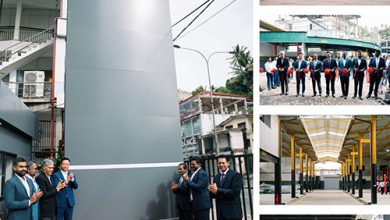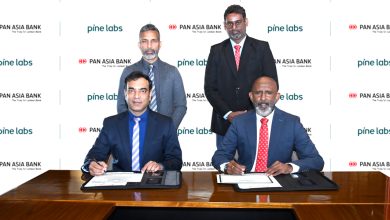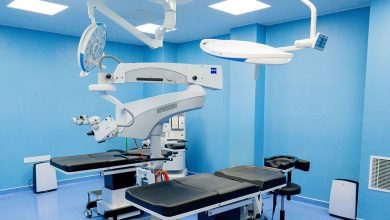NDB
NDB records highest ever PBT from banking operations of LKR 10 Bn for 2019 (6% growth YoY) amidst challenging market conditions
- Net interest income up by 20% YoY
- Net fee and commission income up by 25% YoY
- Total assets crossed LKR 500 Bn mark to reach LKR 530 Bn -up by 12% YoY
- Gross Loans and advances up by 16% to LKR 409 Bn
- Customer Deposits up by 17% to LKR 405 Bn
- NPL ratio contained at 4.77%
National Development Bank PLC recorded LKR 10 Bn profit before tax (PBT), the highest ever PBT in banking operations in its journey of 40 years. This is a 6% year on year [YoY] growth, affirming its resilience in a challenging market environment that prevailed during 2019. NDB’s Profit after Tax was LKR 5.1 Bn, a reduction of 8% over 2018, impacted mainly by the Debt Repayment Levy (DRL) which came into effect on 1 October 2018. The Bank paid additional tax of LKR 1,003 Mn via DRL. The Profit Attributable to Shareholders [PAS], including the performance of the Group companies was LKR 4.8 Bn, a reduction of 7%, over the comparative period impacted by the DRL and subdued performance of the capital markets cluster.
Commenting on the results, Mr. Dimantha Seneviratne – Director/ Group Chief Executive Officer of NDB stated that In a year of subdued economic growth, the NDB Group directed focus on optimising its’ operating models with decisive management interventions aimed at strengthening the Group’s foundation to drive future growth aspirations. In that backdrop, we are pleased to note the growth in profitability and simultaneous growth in the Balance Sheet, where Total Assets reached LKR 530 Bn and advances and deposits each crossed LKR 400 Bn. The Bank is confident that the overall economy as well as the banking industry will take a positive turnaround in 2020, with further policy stability, tax reliefs given to individuals and corporates including banks and financial institutions, and the relief package extended to SMEs which would act as a stimulus for economic revival.
“Internally, we used 2019 to streamline operations and enhance service capabilities, hence now we are geared for a market revival and have placed greater focus on building staff skills to deliver superior customer experience, internal processes, investment in new IT infrastructure, digital capabilities, etc.,”; he stated.
Profitability
Operating income which consists of Net Interest Income (NII), Net Fee and Commission income, income from financial investments, Forex profits and other operating income was LKR 23.6 Bn, a growth of 10% compared to 2018. NII recorded a growth of 20% over 2018 to LKR 17.7 Bn, which was primarily due to growth in the loan book and effective management of the assets and liabilities, amidst a subdued market environment. Net fee and Commission Income, derived from the Bank’s diversified business segments was LKR 3.91 Bn, a YoY growth of 25%, supported by the strong growth in the retail assets and liability base and digital financial services.
Net gains from trading were LKR 990.2 Mn, a reduction of 19% over 2018. Net gains from financial investments at fair value through Profit or Loss was LKR 3.2 Mn whilst net gains from de-recognition of financial assets increased by 87% to LKR 715.8 Mn, due to proactive interest rate risk management initiatives undertaken in a volatile market environment. Other operating income saw a reduction of 84% to LKR 320.3 Mn resulting from the exchange movement on the revaluation of the foreign currency reserves of the Bank, which was due to the appreciation of the Sri Lankan Rupee in 2019 in comparison to depreciation of the LKR in 2018.
The impairment charges for loans and other losses for the year was LKR 4.2 Bn an increase of 16% over 2018. The increase in impairment charges was mainly due the increase in the collective provision charge in line with the growth in the loan book. The Bank also accounted for provisions at individual levels considering elevated risks due to stressed market conditions. Other provisions under impairment charges included provisions made for permanent diminution in fair value of investments. The Bank will continue to place greater focus on collections and recovery processes to mitigate the impact of impairment charges on its profitability.
The Bank’s non-performing loan [NPL] ratio which was on an upward trend since early 2019, reflecting the wider industry scenario, was contained at 4.77% as at 31 December 2019. NDB’s strong risk management initiatives including comprehensive credit evaluation standards, post disbursement follow-ups and underwriting standards have enabled the Bank to manage the loan quality amidst challenging macro-economic conditions and industry stresses.
Total operating expenses for the financial year 2019 was LKR 9.4 Bn, an increase of 11% YoY. Personal expenses increased by 12% to LKR 4.9 bn primarily due to increase in the staff strength to support business expansion. Depreciation and amortization of LKR 525 Mn increased by 19% mainly due to the investments made in new IT infrastructure in its digital journey, opening up of 2 phygital branches, NDB NEOS, strengthening network reach through 54 cash recycle machines and the launch of the revamped NDB mobile banking app – NDB NEOS. The resultant cost to income ratio of the Bank was 39.9%, a marginal increase from 39.3% in 2018.
The Bank’s contribution to the government via taxes was LKR 5.2 Bn, compared to LKR 5.2 Bn for 2018.Total tax charge for the year was LKR 4.9 Bn, comprising VAT on financial services, Nation Building Tax on financial services, Debt Repayment Levy [DRL] and income taxes. LKR 1,003 Mn was incurred as DRL for the year, which was introduced in the latter part of 2018. Overall effective tax rate on the Bank’s profits was 49% as compared to 42% in 2018.
Balance Sheet Growth and Funding
NDB’s total asset base stood at LKR 530 Bn at the close of the financial year, whilst achieving a historic milestone during the year by crossing LKR 500 Bn in total assets. The total asset base grew by 12% over 2018 complimented by the growth in gross loans of 16% to reach LKR 409 Bn and the investment portfolio held for statutory liquid assets purposes. At the Group level, total assets was LKR 535 Bn, a growth of 12% over 2018.
Loan growth during the year, saw a quantum increase of LKR 56 Bn and was recorded mainly in the Retail and project financing segments. Customer deposits grew by 17% to reach LKR 405 Bn, a quantum increase of LKR 57.5 Bn over 2018. The Bank’s Retail segment continued to contribute towards improving the granular deposit base, including CASA deposits during the year, whilst the Bank experienced an outflow of few large CASA deposits, especially in foreign currency during the first half of the year.
The Bank also raised LKR 5.6 Bn via Basel III compliant Tier II debentures to strengthen the Tier II capital base during the first quarter of 2019.
Capital Adequacy
On 20 December 2019, The Central Bank of Sri Lanka issued a direction on the framework for dealing with Domestic Systematically Important Banks (DSIBs), which identifies a DSIB based on a relative score. As per this direction, despite crossing the LKR 500 Bn asset base, NDB’s regulatory capital requirement remains at 8.5% for Tier 1 and 12.5% for Total Capital. NDB’s capital ratios as at 31 December 2019 were 9.18% and 13.43% for Tier 1 and Total capital respectively, well above the regulated minimum ratios. The same ratios for the NDB Group were 10.15% and 14.20%.
Investor returns
The Return on Average Shareholder Funds [ROE] for the Bank was of 13.73% [2018: 17.41%] and the Earnings per Share for the year were LKR 23.05 [2018: LKR 28.44]. The same ratios for the Group were 11.59% [2018: 14.26%] and LKR 21.53 [2018: LKR 26.33] respectively. Return (before tax) on Average Assets for the Bank was 2.01% [2018: 2.22%] and for the Group was 1.97% [2018: 2.17%]. The net asset value per share of the Bank improved to LKR 178.02 from LKR 166.41 as at 31 December 2018 and the same ratio for the Group was LKR 195.60 [2018: LKR 185.49]. The share price closed at LKR 100.00 compared to LKR 106.80 as at 31 December 2018.
During 2019, NDB continued to be recognized with many awards for its excellence in a multitude of areas such as business performance, digital financial services, human relations, quality in financial reporting, sustainability aspects, etc. Some notable awards won were, Winner – Sri Lanka in the World’s Best Consumer Digital Banks Awards 2019 conducted by Global Finance of USA, Best Bank in Sri Lanka 2019 awarded by the AsiaMoney Magazine and the Runner-up at the Best Bank category at the National Business Excellence Awards organized by the National Chamber of Commerce of Sri Lanka for 2019.
2019 was a year of sustained growth for NDB as well as one in which the Bank demonstrated its proficiency in delivering results to all its stakeholders amidst highly challenging circumstances. The Bank’s rich history of 40 years, its committed and skilled human capital and the intrinsic strength of sound systems and procedures in place have positioned the Bank for further enhanced services to the nation and value generated to all stakeholders, in 2020 and beyond.






